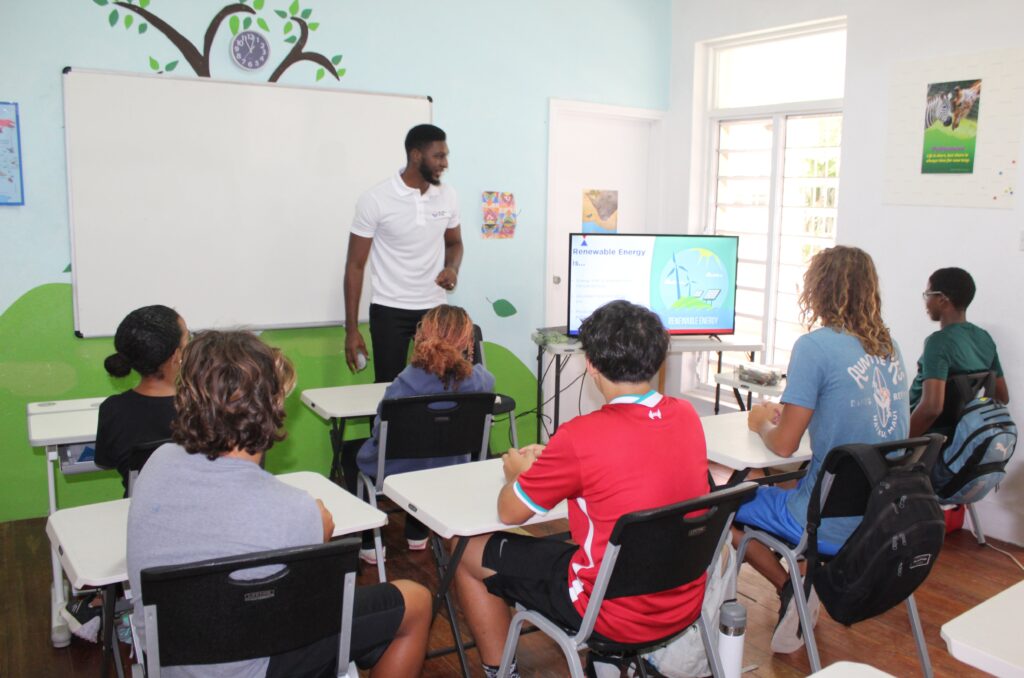10 June 2025, Barbados – In celebration of World Ocean Day, Global OTEC brought ocean energy education to life for students at the Young Explorers School in Barbados. The educational activity, held last Monday (2), introduced Ocean Thermal Energy Conversion (OTEC) technology to 72 students, showcasing its potential to transform the island’s future. The event featured a screening of an animated video that explained the science behind OTEC, followed by the distribution of the company’s Activity Book, a specially designed educational tool that simplifies complex renewable energy concepts into fun, engaging content for young learners.
Global OTEC’s Project Analyst, Kashawn Hall, a proud Barbadian, led the session, offering students a local perspective on how the island could benefit from innovative, ocean-based energy solutions. He highlighted his own experience in becoming interested in renewable energy when reading an article about wind turbines in his late teens and now working to bring OTEC to the forefront of ocean renewables. “More than just that, we at Global OTEC also want to foster the same passion and intrigue in the younger generations for OTEC and other renewables, as they are the future for Small Island Developing States such as Barbados. It was a pleasure engaging with the children, answering their questions, and seeing how knowledgeable they are as well, a knowledge that came later in life for me. Fostered from a young age, this knowledge is ideal for pushing our island forward”, said.
OTEC technology uses the natural temperature difference between warm surface and cold deep seawater in tropical regions to produce clean electricity all year round. Barbados, currently dependent on imported fossil fuels like diesel, has limited options for domestic renewable energy, but a significant untapped ocean thermal energy potential. With
large access to the temperature gradient needed for OTEC to operate, the country can produce clean baseload power from the ocean 24/7, all year round.
This initiative showcases Global OTEC’s commitment to public engagement and its focus on education as a key part of advancing renewable energy in Small Island Developing States (SIDS). By involving the next generation of islanders in the conversations from an early age, the company is contributing to building awareness, inspiring action, and supporting sustainable energy pathways for island nations around the world. “We believe the energy transition needs to be as much about imagination as it is about engineering. By reaching young people in Barbados with ideas like OTEC, we’re planting seeds for a future powered by the ocean, one that’s homegrown, resilient, and right for island nations”, highlighted Global OTEC Founder and CEO Dan Grech.
The OTEC Activity Book is available for free download at globalotec.co/otec-for-kids and can be used in classrooms and other non-commercial settings. Available in English and multiple languages, it offers activities and illustrations to make OTEC learning accessible for children.
How OTEC Works

1. The barge draws in warm surface seawater (of around 26°C) which has been heated by the sun’s rays
2. This warm water is used to evaporate a working fluid with a low boiling point
3. This produces a vapour which spins a turbine to produce electricity using a generator
4. At the same time, cold deep water (of around 4°C) is drawn up through a pipe from the depths of the ocean
5. The cold water cools the vapour, turning it back into a liquid which can then be immediately reused
6. The cycle runs continuously whilst the power generated is transmitted to the grid using a sub-sea cable.
About Global OTEC
Global OTEC is a UK-based company set up to accelerate the commercialisation of a floating OTEC technology to develop zero-carbon, baseload, clean energy sources that achieve maximum impact in empowering SIDS, Least Developing Countries (LDCs) and Coastal Nations with energy security whilst helping the Earth reduce greenhouse gas emissions and eventually eliminate total dependence on fossil fuel.
read our latest news and blog posts:
- Ocean Energy Education brought to Barbadian Students for World Ocean Day
- Offshore electrification through the ocean: how OTEC can provide clean baseload power 24/7 to operations at SeA
- The Baseload Power Source Almost No One Is Talking About
- Global OTEC announces world’s largest onshore OTEC demonstration plant to date
- Over a Century in the Making: A Brief Journey Through OTEC’s History
subscribe to our newsletter
Newsletter
"*" indicates required fields


